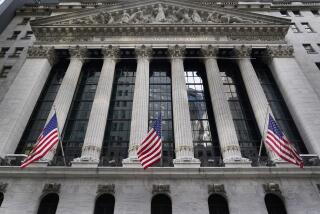Stocks Soar in Moral Vacuum
WASHINGTON — If Kathleen E. Willey, Monica S. Lewinsky, Gennifer Flowers, Paula Corbin Jones and several Jane Doe witnesses whose names are still unknown are telling the truth, then President Bill Clinton isn’t. Correct--or irrelevant?
We’ll see. But the truth may be that America itself is Clintonized, and people don’t want to rock the moral or economic boat. Who cares about whether the president lied or the rich are getting too much when mutual funds keep going up? Who cares about whether some White House aide got groped when Americans bought or rented 600 million--yes, 600 million--adult videos last year? Forget jokes about the first zipper; this guy is what the new America is all about: Easy come, no go.
It’s not so far-fetched--and, worse still, if this mood continues, the public could face a moment of truth should some of the women’s charges start proving out. If indulgence toward speculative finance, bank bailouts and runaway stock valuations is part of a bigger bubble made up of permissiveness, sexaholic officeholders and rampant amorality, then we could see the political equivalent of a triple-witching hour: Clinton ratings, stock indexes and skirt lengths all falling together.
This is the last thing Mr. and Mrs. Mutual Fund Investor want. When the Lewinsky scandal broke and a few crazy Puritans started speculating about impeachment, Americans collectively pushed the “hold” button. No way. The Ozark Casanova’s ratings actually rose 10 points, and so did the number of people who identified America as being on the “right track.” In California, the number who thought the country was on the “right track” jumped from below 50% to a stunning 67%, the highest since the Field Poll started asking the question in 1988.
Are we kidding? The “right track”--when obscene-confession TV shows top the ratings, when foreign fat-cat political contributors get private tours of the Lincoln Bedroom, when Hollywood can make a 10-strike with a movie about a president who stages a phony war to cover up a sexual aberration, when people don’t care if the man in the White House lies?
Yet, that’s the implication. The “right track” numbers, like Clinton’s job ratings, ballooned in January in an obvious rally-round effect. Retaining both Clinton and his market-pampering economics, notwithstanding the odd intern, may well be what “right track” really means. To paraphrase Herbert Hoover’s promise to America, Clinton’s remake would be a pair of up-22% mutual funds in every portfolio and a bimbo in every waterbed--or at least a Kama Sutra tape in every VCR. And you gotta say: The man is delivering.
Of course, some killjoys are around. When O.J. Simpson got off, a couple of Oliver Wendell Holmes types wrote about “The End of Justice.” The crumbling military honor codes produced dirges over “The End of Honor,” even before the 1998 polls showing 59% of Americans didn’t care if Clinton lied. Presumably someone has done “The End of Shame” for people who tell all on Jerry Springer.
And we keep finding new ends to add. One weekly magazine just ran a long piece on “The End of Loyalty,” based on the rat-like behavior visible in the Clinton White House and too many other places. CBS News anchor Dan Rather regretted “The End of Conscience,” when top producers tried to nix a memorial tribute to Fred Friendly, who was president of CBS News when news mattered.
Possibly, however, these observations are scoring only with the minority who think America is very much on the wrong track. If there was such a thing as a national Tawdrometer, the needle would be well in the red. What we seem to have is a United States, despite a few qualms, that is essentially coming out of its own closet with values that aren’t far off Clinton’s. He may be the shrewdest politician of the 20th century--or riding a temperamental tiger.
Ironically, the moral critique of Clinton is probably weightier now than it was three or four years ago, when he had 35% job approval and generated a level of intense hostility. Today’s critical difference seems to be twofold. First, the new level of prosperity and, above all, rising stock markets. Second, the apparent loosening of morals that often accompanies surging financial markets.
The two aren’t opposites. Go-go finance and go-go morality reinforce each other. In the late-1960s bull market, the old adage came true: The Dow Jones industrial average and hemlines rose together. Morals eroded, permissiveness rose in the corporate and financial communities, as well as the college dorms and, finally, the double bubble exploded in 1973-1974, producing a surge of reformism.
The parallel was even more striking in the Roaring ‘20s, when the rising hemlines and rising stock-market averages were accompanied by the growing number of speak-easies and the early investment trusts and Ponzi schemes. This created the biggest bubble of them all: the crash of 1929 and the Great Depression.
The 1990s have essentially the same parallels--hemlines are confused, but adult video sales and Internet porn are keeping pace with the Dow Jones--and we have a Democratic president with a unique background. Clinton grew up in Hot Springs, Ark., a gambling town known for loose money, loose women and loose law enforcement--and killjoy Puritans say he still bears its stamp.
Certainly, his economic policy is as permissive to Wall Street and multinational corporations as his moral flexibility is to Big Sur and Bel-Air. Mergermania is at peak levels and professors are shaking their heads about antitrust law being replaced by pro-trust. Corporate CEOs who dump 8,000 employees to cut expenses and boost their stock prices are welcome in the White House, especially if they’re Clinton fund-raisers. With this kind of favoritism, talk about today’s stock market being a “Clinton market” is fair enough, especially given his role in lifting both barometers--skirts and stock-market indexes.
The norm, of course, is for Republicans to talk about lost personal morality even as they cover up for every greedy tax cut and oil spill around. Some liberal Democrats will lambaste permissiveness to corporations and banks even as they applaud the hands-off approach to pornography. Neither side is good at pinpointing the linkage of a go-go market and go-go culture.
But this is part of what it’s time to start thinking about. If the Dow Jones stays up above 8,500, the odds are good that Clinton’s job numbers will stay in the 50% to 60% range, even if he takes a few ethical and moral blows. However, if there are financial signals that a stock-market peak is at hand--overstretched earnings ratios and frightening book-value relationships--there are also moral signals. These include the musings over the End of Honor, the End of Conscience and the End of Loyalty; we can add the polls showing lies don’t matter and the Variety tabulations of adult movie sales.
March’s Tawdrometer reading is as frightening as the merger statistics, the personal debt levels and the extent to which middle-class Americans are no longer concerned about the rich getting too much and the poor too little. It’s gimme, gimme, gimme at the Sky High Family of Mutual Funds and Victoria’s Secret alike.
If either the financial-market indexes or Clinton’s job-approval ratings start to crack, the other may not be too far behind. It’s tempting to put some numbers around the point where permissiveness might start to crumble and meaningful standards begin to regroup: 45% in the Gallup Poll and 4,500 on the Dow Jones industrial average.
Americans may not like it. But perhaps we deserve it.
More to Read
Inside the business of entertainment
The Wide Shot brings you news, analysis and insights on everything from streaming wars to production — and what it all means for the future.
You may occasionally receive promotional content from the Los Angeles Times.










